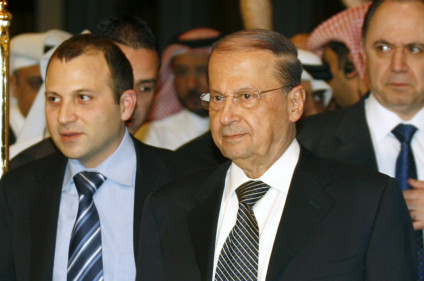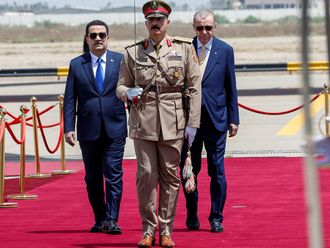
Damascus: What was once a hushed concern over President Michel Aoun’s health has come out into the open, after the Lebanese leader, aged 83, stuttered with a slip of tongue during Army Day celebrations on 1 August.
Instead of saying “jurood” (barren ridges) the ageing president said “qurood” (monkeys).
Since then speculation has been rife in the country on whether or not Aoun is capable of completing his term when it ends in 2022.
Veteran Lebanese analyst Fadi Akoum confirms that the president’s health is suffering.
“While Lebanese officials are pretending that the president is in good health, everybody knows that the reality is different,” he told Gulf News.
“He only works around two hours per day. Those who have meetings with Aoun often end up meeting with his aids instead,” he said.
Previous health scares
In 2013, Aoun reportedly suffered a brain stroke.
Since then, there have been multiple rumours that he has died.
In 2017, he tripped and fell at the Arab Summit in Jordan. It was caught on camera and the media repeatedly aired the clip.
Aoun has suffered from various illnesses since his youth days as a military cadet and had often undergone medical treatment at French hospitals during his long exile in Paris.
What happens if Aoun dies while in office?
Since there is no post of vice-president in Lebanon like in Iraq or Syria, parliament would urgently convene to elect a successor.
In the case of a dissolved parliament, an election body has to be set up to find a replacement.
Potential hereditary successors
Jibran Bassil: Not only does he serve as Lebanon’s foreign minister, he is the son-in-law of Aoun.
Observers believe Bassil is actually the one calling the shots in the country, pointing to his increased political activity.
He’s already taken over from Aoun as the head of the Christian Free Patriotic Movement (FPM).
Having three daughters and no sons, Aoun has largely leant on Bassil to manage his affairs.
A civil engineer turned politician, Bassil, 48, visited the US earlier this month to attend a conference on religious freedom, meeting with Deputy Secretary of State John Sullivan.
Back home, some speculated that he was marketing himself to the Americans as a president-in-waiting.
However, Bassil has refuted such rumours as “baseless accusations”.
Other relatives of Aoun that could possibly be contenders are Brigadier General Chamel Rokouz. The 56-year-old is a former commander of an elite unit in the Lebanese army who also happens to be Aoun’s son-in-law.
He won a parliament seat in May’s election. Less likely candidates are Aoun’s nephews and FPM veterans, Naim and Alan,
Political opponents
During his tenure as president and even before, Aoun has racked up many political opponents like Maronite heavyweights, Samir Geagea of the Lebanese Forces and Sulaiman Franjieh of the Marada Movement and former president, Amin Jemayel.
These men have far more political experience and will to push for their candidacy.
Geagea was a nominee two years ago but withdrew his candidacy when all sides decided to back Aoun in 2016.
However, the powerful Shiite militant group, Hezbollah, which wields significant political power in the country, would never support Geagea for president given his anti-Hezbollah positions.
Franjieh, on the other hand, stands more of a chance, given his close relationship with Syrian President Bashar Al Assad.
Hezbollah has been actively involved in Syria’s civil war, having sent troops to help Al Assad, their chief ally, stay in power.
Franjieh was nominated for office back in 2016 but was abandoned by the pro-Syrian March 8 Alliance in favour of Aoun. Since then, he has been bitter with the FPM and specifically, with Bassil.
Jemayel, another Maronite heavyweight, was president back in the 1980s, when he inherited the post from his brother Bashir, and has an ambition to return to power, serving as an independent within rival Christian factions.
Aoun came to power through a 2016 agreement between Hezbollah and the largely Sunni Future Movement of Prime Minister Sa’ad Hariri, making him president in exchange for Hariri’s return to the premiership.
-With inputs from Layelle Saad, GCC/Middle East Editor












